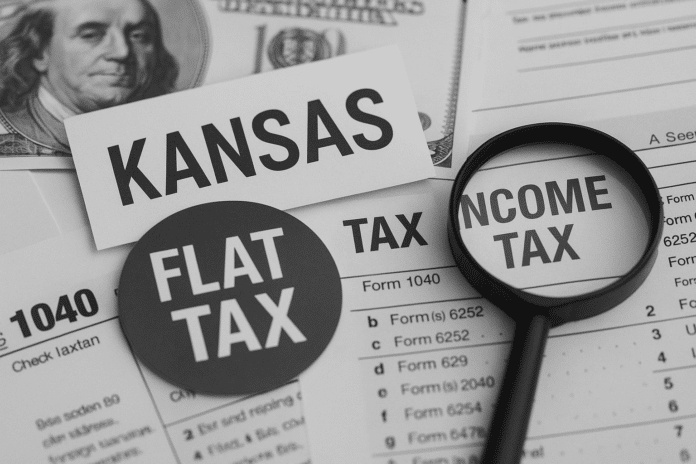TOPEKA, Kan. — A major overhaul of Kansas’s income tax system is underway after lawmakers overrode Governor Laura Kelly’s veto to enact Senate Bill 269, a flat tax measure that will gradually shift both individual and corporate income tax rates to 4%. While proponents argue the change will make Kansas more economically competitive and simplify the tax code, critics warn the benefits are disproportionately tilted toward the state’s wealthiest residents.
Under the current system, Kansas uses a two-tier income tax bracket, with lower earners taxed at 5.2% and higher earners taxed at 5.58%. Senate Bill 269 creates a framework for replacing this system with a flat 4% tax rate—triggered only when specific fiscal benchmarks are met, such as maintaining a 15% balance in the state’s rainy-day fund and exceeding revenue projections adjusted for inflation.
Disproportionate Benefit for Higher Incomes
According to data from the Kansas Reflector and the Institute on Taxation and Economic Policy, the top 20% of Kansas earners—those making more than $143,000 annually—will receive roughly 70% of the total tax relief under the bill. For this group, the average annual tax cut is estimated at $828.
Meanwhile, the bottom 80% of Kansas taxpayers, which includes most working- and middle-class households, will see an average reduction of just $89 per year. Critics argue that while the flat rate may appear equal on paper, it offers far greater benefit to higher earners, both in absolute dollars and as a percentage of overall tax liability.
“This kind of reform simplifies the code, but it does so at the expense of equity,” said one policy analyst with a nonpartisan budget watchdog group. “A household making $35,000 a year might save enough for a tank of gas, while someone making $250,000 saves enough for a weekend vacation.”
Lawmakers Defend the Reform
Supporters of SB 269, mostly Republican lawmakers and business advocacy groups, argue that the measure makes Kansas more attractive to businesses and workers by reducing the overall tax burden. They point to the bill’s automatic revenue triggers as a safeguard to ensure that reductions only occur when the state can afford them.
“This is a win for every Kansan,” said Senate President Ty Masterson. “A fair, flat tax means everyone pays the same rate, and our economy becomes more competitive.”
The law also reduces the corporate income tax rate from 6.5% to 4% and lowers the privilege tax rate for financial institutions to 2.6%.
Governor Kelly’s Veto and Warnings
Governor Laura Kelly vetoed the bill earlier this year, warning it would create a structural deficit in the state budget and fail to deliver on key promises, such as property tax relief.
“Flattening the income tax doesn’t flatten the needs of our schools, roads, and health services,” Kelly said in a statement. “This bill risks putting our state back in the same budget crisis we worked so hard to get out of.”
What Happens Next
The flat tax changes are not immediate. The rates will only drop once Kansas hits the specified revenue and budget thresholds. In the meantime, the debate over fiscal fairness and tax policy is likely to continue, especially as the state approaches a critical election year.
For now, Kansas joins a growing number of states considering or implementing flat tax systems. Whether the policy delivers broad-based economic growth—or simply boosts the bottom lines of the wealthiest Kansans—remains to be seen.





